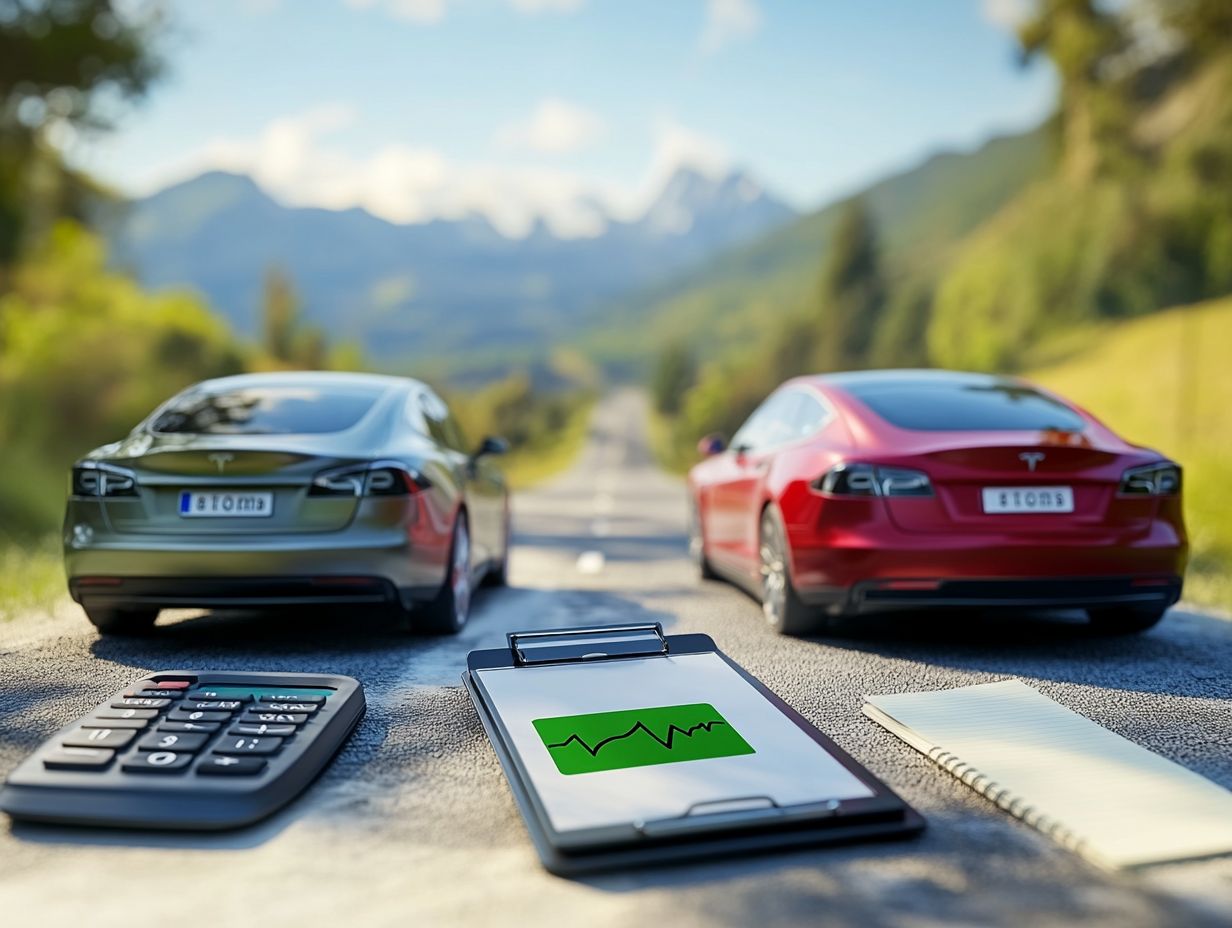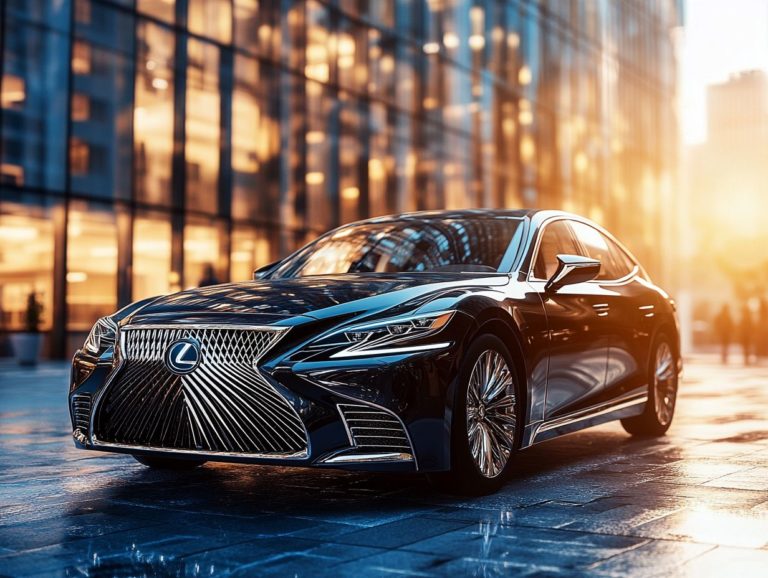The Importance of Comparing Fuel Economy
Understanding fuel economy is more than just a trendy phrase; it s a vital component of vehicle ownership that influences both your finances and the environment.
This article delves into the true meaning of fuel economy, the importance of comparison, and its impact on your daily life. From potential savings to environmental considerations, you ll discover the key factors to assess when evaluating fuel efficiency.
We ll share valuable tools and strategies to optimize your vehicle’s performance and explore the advancements that are shaping the future of fuel economy.
Immerse yourself in this knowledge to make informed choices on your journeys ahead!
Contents
Key Takeaways:

- Comparing fuel economy reduces environmental impact by using less fuel.
- You can save money on fuel costs over time with informed vehicle choices.
- Consider vehicle type and driving habits when comparing fuel economy.
Understanding Fuel Economy
Understanding fuel economy is essential for you. It not only affects your personal finances but also helps the environment by reducing greenhouse gas emissions from vehicles.
Fuel economy measures the distance your vehicle can travel on a given amount of fuel. This is critical for any driver aiming to minimize their carbon footprint.
If you prioritize eco-friendliness, choosing energy-efficient cars can save you money at the pump and positively impact the environment.
What is Fuel Economy?
Fuel economy defines how effectively your vehicle converts fuel into distance traveled, typically measured in miles per gallon (MPG). A higher MPG indicates better fuel efficiency, which is crucial for cost-effective driving.
This important metric provides insights into a vehicle’s performance. Several key factors contribute to MPG, including the vehicle’s weight and the technology integrated into the engine. Heavier vehicles consume more fuel, negatively impacting their MPG. In contrast, advanced technologies like turbocharging and hybrid systems improve fuel economy by optimizing fuel use.
Don’t forget that external factors also influence your vehicle’s efficiency. Consider driving conditions, whether you are cruising at highway speeds or navigating stop-and-go traffic. These elements are essential when evaluating energy-efficient cars, ensuring you make the best choice.
Why Comparing Fuel Economy is Important
Comparing fuel economy is vital if you want to make informed decisions about your vehicle purchases. It directly affects your financial savings as well as your commitment to environmental sustainability.
Higher fuel economy ratings can lead to significant savings on your gasoline expenses and help reduce your carbon footprint an important step in combating climate change.
Understanding how fuel-efficient vehicles impact the environment helps you make sustainable transportation choices that align with your values.
Impact on Environment
The impact of fuel economy on the environment is profound. By choosing vehicles with higher fuel efficiency, you contribute to a significant reduction in greenhouse gas emissions, ultimately helping lower your carbon footprint and addressing climate change.
This relationship underscores the need for stringent emissions standards. These standards encourage manufacturers to innovate and foster advancements in technology that enhance fuel efficiency. As the automotive industry shifts toward sustainable transportation methods, the benefits extend beyond individual vehicles, improving air quality and public health in your community.
Better fuel economy means less reliance on fossil fuels and a decrease in the risk of environmental degradation. By supporting policies that prioritize cleaner vehicles, you can help society reduce its vulnerability to climate-related disasters, paving the way for a more resilient future.
Financial Benefits

The financial benefits of choosing fuel-efficient vehicles are significant, with potential savings at the pump translating into decreased gasoline expenses over time.
This alleviates the pressure on your wallet, allowing you to redirect funds to other essential areas.
It also promotes sustainability within the automotive market. By selecting newer, fuel-efficient models, you can take advantage of advanced technology features designed to optimize fuel economy.
In the realm of pre-owned cars, the demand for models boasting better fuel efficiency is steadily increasing, which can enhance their resale value.
Ultimately, these considerations lead to long-term savings and represent a more financially smart choice for both first-time buyers and seasoned car enthusiasts alike.
How to Compare Fuel Economy
To effectively compare fuel economy, you should leverage a variety of tools and resources designed to assess fuel economy ratings. These insights will not only enhance your understanding of the driving experience but also provide clarity on the vehicle performance of different models.
Factors to Consider
When you re comparing fuel economy, it s essential to consider several key factors, including fuel economy ratings, the condition of the vehicle, transmission options, and various driving modes that can influence overall fuel efficiency.
The advancements in engine technology have transformed how vehicles manage fuel consumption, significantly enhancing overall miles per gallon (MPG) performance. For example, direct fuel injection systems ensure fuel mixes better with air, leading to more power and better fuel use. The integration of continuously variable transmissions (CVTs) ensures smooth and efficient power delivery across a broader range of speeds, minimizing energy loss.
Features like eco-driving modes adjust throttle response and shift patterns, further improving fuel efficiency. Collectively, these technological advancements highlight the crucial role of modern engineering in achieving exceptional fuel economy in today s vehicles.
Tools and Resources
Don’t wait! Leverage tools and resources at your fingertips to compare fuel economy ratings today! From EPA-estimated figures to online calculators and specialized websites offering insights into vehicle performance, there are numerous options available.
One of your most valuable resources is the official EPA website, which provides comprehensive data on fuel efficiency across a variety of makes and models. You can also make use of mobile apps like Fuelly, which allow you to track your own fuel economy in real time, giving you a detailed look at how your vehicle performs under different driving conditions.
Many consumers find value in visiting forums and car review sites, where community feedback can dispel myths and reveal practical insights. By leveraging these tools, you can make well-informed choices that perfectly align with your lifestyle, all while prioritizing vehicles with superior EPA estimates and robust performance metrics.
Improving Fuel Economy
Boosting your fuel economy can elevate your vehicle’s efficiency while significantly reducing your environmental impact!
By embracing a range of tips and strategies, you can effortlessly transform your driving habits and contribute to a more sustainable future.
Tips and Strategies

Use fuel-saving features and adopt effective driving techniques to enhance fuel economy. These actions help you benefit from your vehicle’s intelligent stop-start system and a system that optimizes engine performance.
To truly harness the potential of these technologies, prioritize regular maintenance such as timely oil changes and air filter replacements. These can significantly influence your engine s performance.
Accelerate smoothly and use gentle braking techniques to improve your overall efficiency. This allows the engine to operate at its best. Maintaining optimal tire pressure is equally vital; under-inflated tires increase rolling resistance and decrease fuel efficiency.
By adopting these practices and embracing eco-driving habits, you can save money on fuel and enjoy a more cost-effective driving experience!
Future of Fuel Economy
New technologies are shaping the future of fuel economy. This includes cutting-edge energy management systems designed to enhance performance while meeting ever-changing emissions standards.
Advancements and Innovations
Recent advancements in engine technology and aerodynamic design have greatly improved fuel efficiency. These innovations allow modern vehicles to meet stricter emissions standards while enhancing overall driving performance.
One standout improvement is turbocharging, which boosts engine power without increasing size, effectively optimizing your fuel consumption. Hybrid systems merge traditional combustion engines with electric power, delivering impressive mileage gains especially in urban settings where frequent stops and starts are typical.
Innovations in lightweight materials, like high-strength steel and aluminum, also help reduce your vehicle’s weight. This translates to better aerodynamics and less energy required for acceleration, leading to lower fuel costs and a more responsive and pleasurable driving experience.
Frequently Asked Questions
What is fuel economy?
Fuel economy refers to how efficiently a vehicle uses fuel, measuring the distance it can travel on a certain amount of fuel. Understanding fuel economy helps consumers make better decisions when buying a vehicle and saves money on fuel.
How can comparing fuel economy help me save money?

By comparing fuel economy, you can choose a more fuel-efficient vehicle, saving money on fuel expenses over time. It also helps identify cost-effective fuel options, like hybrid or electric vehicles instead of traditional gasoline-powered cars.
Is comparing fuel economy only important when purchasing a new vehicle?
No, comparing fuel economy is important throughout your vehicle’s entire ownership. It can guide decisions about maintenance and driving habits that improve fuel efficiency and save money.
How does fuel economy impact the environment?
Fuel economy affects the environment because vehicles with lower fuel efficiency emit more pollutants. By choosing more fuel-efficient vehicles, you can lower your carbon footprint and help protect the environment.
Are there tools to help me compare fuel economy?
Yes! Many tools can help you compare fuel economy, including government websites like FuelEconomy.gov, which provide details on different vehicles’ fuel economy. Consumer reports and reviews are also great resources.
Start checking your fuel economy today to see how much you can save!
Does comparing fuel economy only apply to cars?
Did you know that comparing fuel economy matters for all vehicles? This includes trucks, SUVs, and motorcycles.
Fuel efficiency is also crucial for other modes of transportation like planes and trains. It helps reduce operating costs and minimizes environmental impact.





